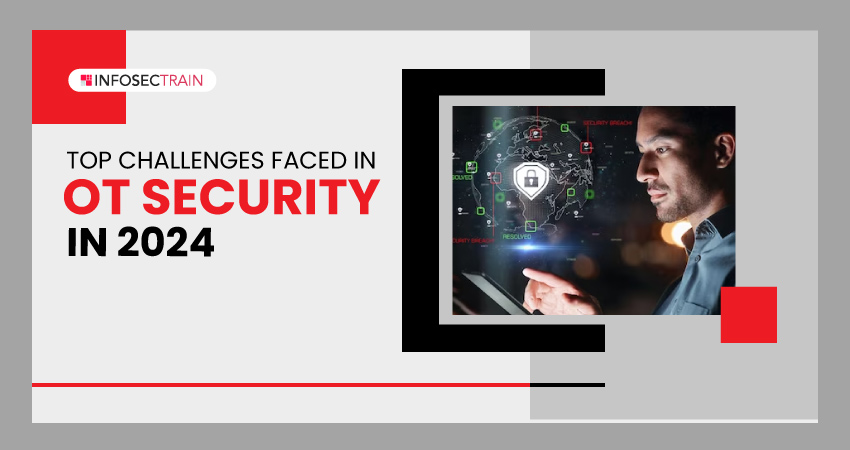Top Challenges Faced in OT Security in 2024
In the modern, interconnected world, industrial operations heavily depend on Operational Technology (OT) systems to manage and control critical processes and infrastructures effectively. These systems are essential in industries like healthcare, energy, transportation, manufacturing, and ensuring the efficient functioning of vital operations. Nevertheless, as these OT systems become increasingly intertwined with Information Technology (IT) networks and the internet, they face new cybersecurity challenges. The security of these OT systems has become a global industrial concern. This discussion delves into the primaryOT security challenges.

What is OT Security?
Operational Technology (OT) security involves the practices, methods, and strategies used to protect vital operational technology systems and assets from cyber threats, unauthorized access, and disruptions. This encompasses Industrial Control Systems (ICS), SCADA systems, and other technologies critical for monitoring and controlling physical processes across various sectors such as energy, manufacturing, logistics, healthcare, and more.
To deepen your comprehension of OT, you might find exploring the “Introduction to OT Security” link beneficial in expanding your knowledge about this subject matter.
Top Challenges in OT Security
Some of the prevalent challenges in OT security include:
- Limited IT Engagement:Often, there is a lack of collaboration and communication between IT and OT teams in organizations, leading to security gaps. OT staff might not fully comprehend necessary cybersecurity measures, while IT professionals may not understand the specifics of industrial processes. This gap can compromise the creation of effective security strategies, leaving OT systems at risk.
- Convergence of IT and OT: While integrating IT and OT systems boosts efficiency, it also complicates OT security and enlarges the attack surface. Harmonizing these domains’ different priorities, technologies, and operational requirements is crucial to prevent vulnerabilities in one area from impacting the other.
- Legacy Operating Systems and Equipments: Many OT environments use outdated equipment and operating systems, which pose significant security challenges. These legacy components often lack modern security features and updates, making them easy targets for cyberattacks.
- Lack of Security Knowledge:While OT personnel may be industrial-process experts, they might lack awareness of modern cybersecurity best practices. This knowledge gap can lead to unsafe practices and insufficient responses to security incidents.
- Complex and Diverse Environments: OT environments often consist of various interconnected devices, sensors, controllers, and software from different vendors. This diversity leads to complicated and heterogeneous systems that can be difficult to manage and defend efficiently.
- IoT Botnets and DDoS Attacks: The proliferation of Internet of Things (IoT) devices in OT networks raises concerns about the potential for attacks. Compromised IoT devices can be utilized by hackers to initiate DDoS attacks, causing disruptions to vital systems.
- Network Architecture Erosion: As OT systems evolve, the original network architecture might become more complex due to the integration of new technologies. This can lead to unclear boundaries between various network parts, making monitoring and defending against cyber threats difficult.
- Utilization of Cloud Services and Internet: The growing use of cloud services and internet connectivity in OT environments broadens the attack surface. While these technologies offer benefits like remote monitoring and data storage, they also create new avenues for cyber threats.
Addressing these challenges requires a comprehensive strategy integrating cross-industry collaboration, personnel training, policy development, and technological solutions. With the growing dependence on networked OT systems, organizations must recognize these challenges and invest in robust cybersecurity measures to safeguard crucial infrastructure and operations.
Related blogs:
- What is Operational Technology (OT)?
- Key Components of OT: Empowering Industrial Control & Monitoring
- Roles and Responsibilities of OT Security Professionals
- How to Make a Career Transition to OT Security
- Fundamentals of OT/ICS Security Foundation
- OT/ICS Security Interview Questions
- How to Secure an OT Network?
OT/ICS Security Training with InfosecTrain
Individuals interested in comprehensively understanding Operational Technology (OT) and Industrial Control Systems (ICS) security can enroll in InfosecTrain’s OT/ICS Security Foundation Training Program. We aim to provide you with a thorough understanding of OT/ICS components, architecture, tools, technologies, and OT security best practices. Our course will also provide insights into topics such as the architecture of industrial systems, common OT security vulnerabilities and threats, risk assessment and management, and incident response strategies in OT environments.




 1800-843-7890 (IN)
1800-843-7890 (IN) sales@infosectrain.com
sales@infosectrain.com
 1800-843-7890 (India)
1800-843-7890 (India) 
